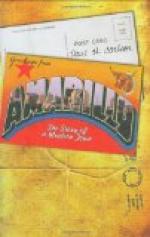“All is lost,” said Mrs. Carriswood to herself; yet she smiled. Going home, she found a word for Tommy’s ear. The old Virginian dinner had been most successful. The Fitzmaurices (who had been almost forced into the banquet by Beatoun’s imperious hospitality) were not a wet blanket in the least. Patrick Fitzmaurice, brogue and all, was an Irish gentleman without a flaw. He blossomed out into a modest wag; and told two or three comic stories as acceptably as he was used to tell them to a very different circle—only, carrying a fresher flavor of wit to this circle, perhaps, it enjoyed them more. Mrs. Fitzmaurice looked scared and ate almost nothing, with the greatest propriety, and her fork in her left hand. Yet even she thawed under Miss Van Harlem’s attentions and gentle Mrs. Beatoun’s tact, and the winning ways of the last Beatoun baby. She took this absent cherub to her heart with such undissembled warmth that its mother ever since has called her “a sweet, funny little old lady.”
They were both (Patrick and his wife) quite unassuming and retiring, and no urging could dissuade them from parting with the company at the tavern door.
“My word, Tommy, your mother and I can git home by ourselves,” whispered honest Patrick; “we’ve not exceeded—if the wines were good. I never exceeded in my life, God take the glory!”
But he embraced Tommy so affectionately in parting that I confess Mrs. Carriswood had suspicions. Yet, surely, it is more likely that his brain was—let us not say turned, but just a wee bit tilted, by the joy and triumph of the occasion rather than by Beatoun’s port or champagne.
But Mrs. Carriswood’s word had nothing to do with Tommy’s parents, ostensibly, though, in truth, it had everything to do. She said: “Will you dine with us to-morrow, quite en famille, Thomas?”
“I ought to tell you, I suppose, that I find your house a pretty dangerous paradise, Mrs. Carriswood,” says Tommy.
“And I find you a most dangerous angel, Thomas; but—you see I ask you!”
“Thank you,” answers Tommy, in a different tone; “you’ve always been an angel to me. What I owe to you and Harry Lossing—well, I can’t talk about it. But see here, Mrs. Carriswood, you always have called me Tommy; now you say Thomas; why this state?”
“I think you have won your brevet, Thomas.”
He looked puzzled, and she liked him the better that he should not make enough of his conduct to understand her; but, though she has called him Tommy often since, he keeps the brevet in her thoughts. In fact, Mrs. Carriswood is beginning to take the Honorable Thomas Fitzmaurice and his place in the world seriously, herself.
MOTHER EMERITUS
The Louders lived on the second floor, at the head of the stairs, in the Lossing Building. There is a restaurant to the right; and a new doctor, every six months, who is every kind of a healer except “regular,” keeps the permanent boarders in gossip, to the left; two or three dressmakers, a dentist, and a diamond merchant up-stairs, one flight; and half a dozen families and a dozen single tenants higher—so you see the Louders had plenty of neighbors. In fact, the multitude of the neighbors is one cause of my story.




